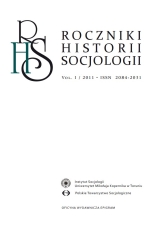Liberalism and the Conflict of Traditions
Abstract
The paper contains a critique of Jerzy Szacki’s stance presented in his Liberalism after Communism. The critique is a starting point for a theory of the conflict of traditions in liberal democracies, which is presented here and improved. The original version was presented in the author’s book On the Conflict of Traditions. The leading thesis of the latter reads: the one and the only possible liberal political doctrine (which is that of liberalism strictly speaking) implies a metaphysically burdened notion of good; otherwise it could not be self-consistent. Accepting the notion subsequently enables a justification of the possible conflict of traditions, without breaching the principles of the liberal public sphere. The mainstream modern liberal political theory (liberalism in the common sense of the word) does not respect the notion, which threatens the systemic self-consistency; this also applies to the Polish discourse on liberalism. In the first two parts of the paper, Szacki’s position is presented and criticized. In the third part, the main thesis is put forward. The thesis is, in turn, illustrated by the example of the history of liberalism in the Third Polish Republic. In the fifth part, the notions of liberalism sensu stricte, and that of liberalism understood commonly, are presented. Finally, conclusions are drawn from Szacki’s point of view regarding the experience of 24 years of liberalism in Poland.
 Roczniki Historii Socjologii
Roczniki Historii Socjologii